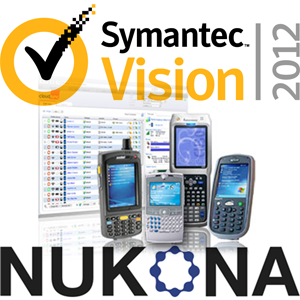 NEWS
NEWS
 NEWS
NEWS
 NEWS
NEWS
![]() As the enterprise sector begins to look deeper into the trend of allowing their workers to bring their own device to the workplace—as opposed to a proprietary model designed for the enterprise itself—a number of security risks begin to crop up. Uncontrolled hardware and software means that a bad guy or malware could gain access to sensitive information via that device.
As the enterprise sector begins to look deeper into the trend of allowing their workers to bring their own device to the workplace—as opposed to a proprietary model designed for the enterprise itself—a number of security risks begin to crop up. Uncontrolled hardware and software means that a bad guy or malware could gain access to sensitive information via that device.
In a bid of their own, antivirus and security company Symantec appears to be looking for a turnkey solution for businesses to let their workers go with the flow without opening themselves to potential breaches. A blog post about this trend by Brian Prince at SecurityWeek mentions the keynote at the Symantec Vision and where this might take the company in the future.
“Our vision is, (for) bring-your-own-device, is you need to manage devices, and you need to manage and control the applications,” Symantec CEO Enrique Salem said during his keynote at the Symantec Vision Conference in Las Vegas, California.
To this end, Symantec is looking to Nukona, a mobile device management application company that the antivirus and security vendor acquired earlier this year. In 2011, Citrix invested in Nukona themselves as part of an accelerator program, as a virtualization company well known for siting in the forefront of bringing the office-into-unexpected-places, that investment appears that it will soon pay off for the industry.
Nukona’s app management platform allows IT departments to make their own virtual machines inside of mobile devices, let users enter into that and access available apps, encrypt in transit, encrypt on device, and even make policies on what information and networks they can access. As a result, the Nukona-driven Symantec BYOD solution will provide a sort of DMZ safe-zone for businesses to trust third-part devices in the hands of their workers.
Brian Duckering, senior manager of enterprise mobility at Symantec, thinks that this is key to increasing worker productivity by allowing them to bring their own devices:
“The problem comes when maybe you are in a regulated industry…if one of those companies wants to do BYOD they are going to have a problem because the policies that they would apply in their MDM (mobile device management) solution are going to be pretty severe, and they should be,” he said. “The problem is then the end user brings in their own device, and [says], ‘I’m not going to sign up for this – I don’t want you turning off my camera, blocking access to the app store [and] doing all these other things. I am paying for this device.’”
“If you can put authentication, encryption, copy control and all of the controls that you need on that app that contains the data, you can actually accomplish what you need to without taking over the entire device,” Duckering added.
Symantec Mobile is looking to hook into both iOS and Android devices with their venture which should open up most of the market to them.
Currently, much of the BYOD trend is being seen warily by the enterprise sector because of the risks involved. A survey done by Mimecast revealed that 26% of the industry still doesn’t permit BYOD for official tasks, and 21% consider it too high a risk. Those percentages may feel like they’re small; but they’re the undercurrent beneath the modern-day expectations of mobile devices, especially with Android malware on the rise and the potential that trade secrets could be leaked should a mobile device get left on a bar stool or targeted-and-pilfered at a technology conference.
Looking at BYOD not as proprietary device-centric but as virtual machine and software management could provide a solution that would allow a wider variety of devices to enter into the protected huddle of corporate networks. With proper policies, intrusion detection, and especially on-board encryption that scrambles or destroys sensitive information on mobile devices will go a long way to preventing it from falling into the wrong hands or getting leaked.
Symantec Mobile may be hitting a nerve with the industry, but should they provide a secure management for mobile on and off network, they could ride this way all the way into the sunset.
Support our mission to keep content open and free by engaging with theCUBE community. Join theCUBE’s Alumni Trust Network, where technology leaders connect, share intelligence and create opportunities.
Founded by tech visionaries John Furrier and Dave Vellante, SiliconANGLE Media has built a dynamic ecosystem of industry-leading digital media brands that reach 15+ million elite tech professionals. Our new proprietary theCUBE AI Video Cloud is breaking ground in audience interaction, leveraging theCUBEai.com neural network to help technology companies make data-driven decisions and stay at the forefront of industry conversations.